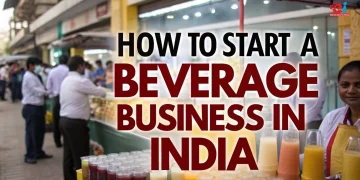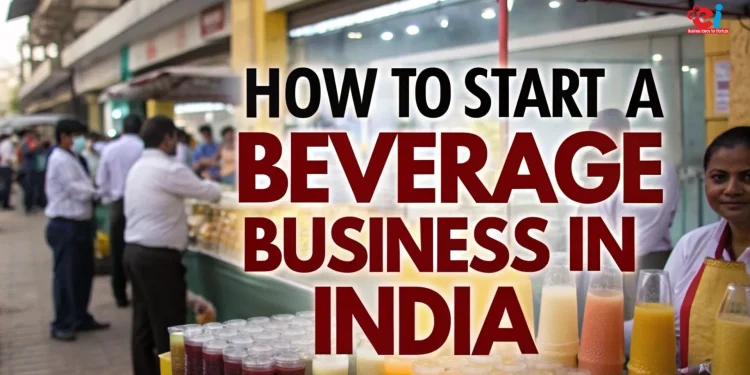India’s nonalcoholic beverage industry has exploded. At the core of this growth are new franchise models that cater for urban tastes and changing consumer preferences. The demand for quality and experiential beverage offerings is on the rise. From health-centric smoothie cafés to innovative Bubble Tea outlets, there has been a surge in the number of milkshake bars. Starting a beverage business is a low-risk and scalable opportunity for aspiring entrepreneurs.
This article provides a complete guide for Indian entrepreneurs, from understanding the market to choosing the right franchise and manufacturing insights to digital growth strategies.
The Beverage Industry: A Sector Transforming
India’s beverage market is experiencing a rapid change. Soft drinks and aerated beverage once dominated the industry, but now the focus is on healthier and premium beverages. Today’s consumers aren’t just buying drinks, but also brands, ambiance and health value.
This sector includes milkshake lounges and juice bars. These franchise formats are spreading beyond metros to Tier 2 and 3 towns, thanks to the growth of mall culture, youth cafes, and a booming delivery food ecosystem.
Franchising allows entrepreneurs access to proven models, where brand, menu, vendor relations, and operational knowledge are already established. It reduces risk and removes early barriers of entry.
Related: Top 10 Beverage Franchise Opportunities For Indian Entrepreneurs
Market Forecast: Growth, Demand, and Emerging Trends
India’s nonalcoholic beverage business is on a growth trajectory that will last several years. Consumer behavior has been reshaped by health and wellness trends as well as increased disposable incomes and global drinking cultures.
Market forecast (Rs in crores)
| Year | Market Size |
| 2025 | Rs85,000 Cr |
| 2026 | Rs. 98.500 Cr |
| 2027 | Rs 1,12,800 Cr |
| 2028 | Rs 1,29,400 Cr |
| 2029 | Rs 1,47,800 Cr |
| 2030 | Rs. 1,68,000 Cr |
This growth is driven by a number of factors. The consumer is increasingly choosing functional drinks such as probiotic yogurts, vitamin-enriched water, and detox juices. Traditional categories such as milkshakes and lasses have also been modernized, rebranded, and tailored to fit premium urban cafes. Franchise outlets also benefited from the expansion and popularity of third-party delivery platforms. These platforms now account for a large portion of their revenues.
Social media and influencers have intensified the appeal of visually appealing beverages. Think rainbow smoothies, boba with pearls floating in it, and creatively packaged brews.

Why beverage franchises make business sense
A beverage franchise is appealing because of its simplicity, ease of operation, and ability to adapt to different formats, such as kiosks, quick service counters, cloud-kitchens, or fully-fledged cafés. Many new entrepreneurs use it as a stepping-stone to building a larger hospitality or food brand.
The support system that comes with a franchise is strong — standard menus, supply-chain partnerships, and training protocols for staff. It reduces your learning curve and lets you focus on local marketing and customer service.
In addition, the space required for beverage business outlets is less than that of restaurants or bakeries. Also, compliance requirements are simpler. Focus is placed on speed, cleanliness, and consistency. These can all be managed by a small staff.
Franchise owners who have the support of a brand can grow faster, reach break-even sooner and possibly operate multiple outlets after the model has proven successful.
How to Choose the Best Beverage Brand
Before you make a commitment, it is important to carefully evaluate the franchise. Some brands are well-known, while others provide flexibility and cost savings.
Consider more than just the name of the franchise. Take into account how the franchise manages supply chain logistics, level of training, marketing support and adaptability to local preferences. Successful brands will have systems to help you manage your staff, source ingredients and drive customer footfall both online and offline.
Most franchises are aware of the importance of adapting to local conditions. A milkshake brand could offer filter coffee to Chennai or a juice shop in Kolkata might introduce detox drinks based on jaggery. These regional experiments can make a big difference to a company’s long-term viability.
Related: Aluminium Can For Beverages: A High-Margin, Low-Waste Business Model for Emerging Markets
The Manufacturing and Supply Process
Understanding how beverage business are made and delivered, even if you operate a front-end store, is essential. Most beverage Business uses a semi-centralized or centralized Manufacturing system. This is especially true for packaged products, syrups and bases.
The process for dairy drinks such as milkshakes begins with the selection of high-quality, fresh milk. This is followed by the pasteurization of the milk, homogenization, and the addition of flavorings, syrups, or stabilizers. The drinks are cooled, bottled, and transported via cold-chain logistics.
Some juice bars rely on fruit pulps or purees that are made at the store, while others are supplied by regional production hubs. Bubble tea cafes rely on tapioca and tea syrups that are imported or produced locally. They require specific storage and preparation methods.
Franchise owners are responsible for the backend of their business, which includes inventory management, storage hygiene and consistent recipe implementation. With digital POS systems and temperature-monitoring equipment, most of these processes are now easily manageable.
The Key Challenges to Prepare for
Even though running a beverage business has many benefits, it also comes with a number of challenges. The location is still the most important factor. A well-known brand may fail in an area with low traffic, but a lesser-known one can flourish in a commercial complex or college hub.
Demand fluctuations can also impact revenue. You may see a spike in sales of summer drinks for six to eight months. However, the cooler months will require you to switch to warm teas and light snacks.
A second concern is the staff turnover. As beverage cafes depend on front-end staff trained to prepare and serve drinks for customers, poor training or frequent hiring can affect quality. This risk can be reduced by choosing a franchise with structured training modules and regular quality checks.
Packaging and sustainability are also becoming major business concerns. Many state governments have pushed for a plastic ban, and eco-conscious customers prefer eco-friendly packaging. Select a brand that is proactive about adopting biodegradable material, reusable cups or digital receipts.
Multi-Unit Expansion: The Potential
Expanding into new locations is an attractive option once your first franchise outlet has stabilized and achieved profitability. Multi-unit ownership can boost your income and allow you to optimize staffing, marketing, and procurement.
Some brands offer master franchises that allow entrepreneurs to manage multiple outlets within a particular city or state. This model is ideal for business owners who are looking to expand their portfolios in the F&B sector.
Some entrepreneurs, however, use the knowledge gained through a franchise as a springboard to launch their brand of beverage. This is a logical progression; once they have a good understanding of consumer preferences, the sourcing process, and the economics.
Digital Growth and Omnichannel Engagement
Brands of beverages are no longer able to ignore the importance of a strong digital presence. Franchises must be able to operate seamlessly across all delivery methods, including online, dine-in, and takeaway. Integration with delivery apps such as Swiggy and Zomato, along with loyalty programs, can boost customer retention.
Social media marketing is a key component of the beverage business. Instagram reels featuring visually stunning drinks, influencer campaigns or limited-edition seasonal offerings are often viral and drive new footfall.
You must also provide digital tools such as POS-based tracking of inventory, feedback systems, and real-time analysis. Brands that offer this type of technology empowerment are usually more efficient and engage customers better.
Policy Environment & Government Incentives
Indian government supports MSMEs and food processing businesses. Franchise owners may qualify for FSSAI, Startup India or MSME Udyam Registration schemes.
Some states also offer tax incentives or subsidies for the establishment of food retail outlets in rural and semi-urban areas. Your franchisor can guide you through the basic requirements, such as FSSAI licences, pollution certificates, or shop registration. However, you are responsible for ensuring that you adhere to all legal hygiene standards to avoid any penalties or disruptions.
For more information check out this video
Final Thoughts on a Scalable and Rewarding Business Model
It’s not only about selling drinks when you start a beverage franchise. It’s all about creating a hub in your community where people can socialize, relax, and experience the brand. Outlets that combine a strong backend system, a loyal client base, and digital engagement strategies will be the future.
This space is ripe with opportunity for entrepreneurs, thanks to the rising demand, improved logistical systems, and brand-led franchise models. You can launch a small cafe in a shopping mall or a kiosk near a university. The opportunities are endless, provided you select the right partner and manage it with operational discipline.
Which business to start? How to choose a business idea?
Niir Project Consultancy Services
Niir Project Consultancy Services (NPCS) offers detailed market surveys and techno-economic feasibility reports to entrepreneurs and startup founders. These reports include everything from manufacturing processes and raw materials to plant layouts and financials. They help you assess the true potential of your beverage business. NPCS can help you assess the feasibility of establishing new industries in the F&B and beverage sectors.


















